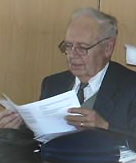A New Train Paradox: Can Clock Time Depend on the Direction of Motion?
Year: 2010 Pages: 1
Velocity is defined as distance traveled per time, hence c = x/t. The dilation of time in special relativity is given by the factor: t' = t / (1 - v? / c?)1/2. Moreover, due to the Lorentz-contraction x' = x / (1 - v? / c?)1/2 as well. Calculating space and time for c' = x'/t', either stretching factor in the numerator and the denominator cancel out. This leads to a paradox: If the velocity of light is constant in any system, i.e. if c = c', clocks will have to alter their pace depending on the direction of motion.


